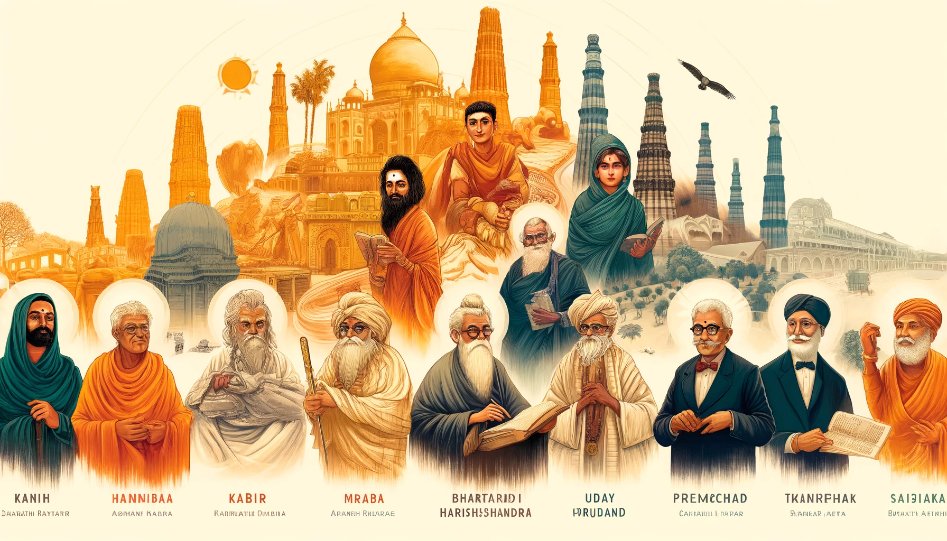Classic Hindi Writing and Authors Through History

The rich tapestry of Hindi literature has woven itself through the annals of Indian history, reflecting the cultural, social, and political milieu of various eras. From ancient scriptures to modern narratives, classic Hindi writing has played a pivotal role in shaping the literary heritage of India. This article delves into the evolution of Hindi literature and highlights some of the most influential authors who have left an indelible mark on this literary landscape.
Ancient and Medieval Hindi Literature
Bhakti Movement (14th - 17th Century)
The Bhakti movement, which emphasized devotion and the personal relationship between the devotee and the divine, gave rise to some of the most celebrated works in Hindi literature. Saints and poets like Kabir, Tulsidas, and Mirabai were central figures during this period.
- Kabir (1440-1518): A mystic poet and saint, Kabir's dohas (couplets) are renowned for their simplicity and profound spiritual messages. His verses often criticized religious orthodoxy and promoted a universal path to spirituality.
- Tulsidas (1532-1623): Best known for his epic poem "Ramcharitmanas," Tulsidas reinterpreted the Sanskrit Ramayana in Awadhi, making the story of Lord Rama accessible to the common people. His work remains a cornerstone of Hindi literature.
- Mirabai (1498-1547): A Rajput princess turned saint-poetess, Mirabai's devotional songs dedicated to Lord Krishna are still sung today. Her poetry reflects her unwavering devotion and mystical experiences.
The Emergence of Modern Hindi Literature
Bharatendu Era (Late 19th Century)
The late 19th century, often referred to as the Bharatendu era, marked the beginning of modern Hindi literature. Bharatendu Harishchandra (1850-1885) is hailed as the father of modern Hindi literature. His works laid the foundation for a new wave of literary expression.
- Bharatendu Harishchandra: A pioneer of modern Hindi prose and poetry, Bharatendu's works addressed social issues, promoted patriotism, and emphasized the importance of Hindi as a national language. His notable works include "Bharat Durdasha" and "Andher Nagari."
Dwivedi Yug (Early 20th Century)
The early 20th century, known as the Dwivedi era, was marked by the contributions of Mahavir Prasad Dwivedi, who played a crucial role in standardizing Hindi and promoting it as a literary language.
- Mahavir Prasad Dwivedi (1864-1938): A prolific writer, editor, and scholar, Dwivedi's efforts in editing the literary magazine "Saraswati" helped shape the course of Hindi literature. His writings emphasized moral values, social reform, and literary excellence.
Chhayavad Movement (1918-1936)
The Chhayavad movement, often likened to the Romantic movement in English literature, brought a wave of lyrical and emotional poetry. This period saw the emergence of four key poets, collectively known as the pillars of Chhayavad.
- Jaishankar Prasad (1889-1937): A master of both poetry and drama, Prasad's works like "Kamayani" and "Skandagupta" are revered for their lyrical beauty and philosophical depth.
- Suryakant Tripathi 'Nirala' (1896-1961): Known for his innovative and rebellious style, Nirala's poetry, such as "Saroj Smriti" and "Rambha," broke traditional norms and explored new literary forms.
- Sumitranandan Pant (1900-1977): Pant's poetry is characterized by its romanticism, nature imagery, and spiritual themes. His notable works include "Pallav" and "Gunjan."
- Mahadevi Verma (1907-1987): Often referred to as the modern Meera, Verma's poetry exudes a deep sense of spirituality and mysticism. Her collection "Nihar" and "Yama" are considered masterpieces.
Progressive Writers' Movement (1936-1955)
The Progressive Writers' Movement aimed to address social and political issues through literature. Writers during this period were influenced by Marxist and socialist ideologies.
- Premchand (1880-1936): A pioneer of modern Hindi-Urdu fiction, Premchand's novels and short stories, such as "Godaan" and "Nirmala," highlighted the plight of the poor and the injustices of society. His realistic portrayal of rural India earned him the title of Upanyas Samrat (Emperor of Novels).
- Yashpal (1903-1976): Known for his revolutionary writings, Yashpal's works like "Jhutha Sach" and "Deshdrohi" reflect the socio-political upheavals of his time.
Post-Independence Hindi Literature
The post-independence era saw the diversification of themes and styles in Hindi literature. Writers began exploring new genres, including existentialism, surrealism, and experimental fiction.
- Nirmal Verma (1929-2005): A prominent figure in the Nayi Kahani (New Story) movement, Verma's stories, such as "Parinde" and "Kavve Aur Kala Pani," delve into human psyche and existential dilemmas.
- Krishna Sobti (1925-2019): Known for her bold and innovative writing, Sobti's novels like "Mitro Marjani" and "Zindaginama" explore complex human relationships and social issues.
Contemporary Hindi Literature
Contemporary Hindi literature continues to evolve, embracing new themes and narrative techniques. Modern authors experiment with form and content, reflecting the changing dynamics of Indian society.
- Uday Prakash: A leading contemporary writer, Prakash's works, such as "Peelee Chhatri Wali Ladki" and "Dharam Ka Murda," offer a critical look at modern Indian life and its contradictions.
- Geetanjali Shree: Known for her innovative storytelling, Shree's novel "Ret Samadhi" (Tomb of Sand) has garnered international acclaim for its unique narrative style and depth.
Conclusion
The journey of Hindi literature is a testament to the language's versatility and resilience. From the devotional fervor of the Bhakti poets to the progressive zeal of modern writers, Hindi literature has continually evolved, reflecting the diverse experiences and aspirations of its people. The contributions of classic Hindi authors have not only enriched the literary world but have also played a significant role in shaping the cultural and intellectual fabric of India. As we move forward, the legacy of these literary giants will continue to inspire and influence generations of readers and writers alike.



